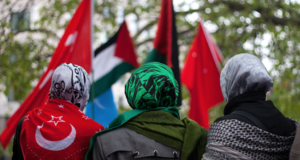Featured Opinion:The Right of Return: An Obstacle on the Road to Peaceful Negotiations Between Israel and Palestine
By
2012, Vol. 4 No. 01 | pg. 3/3 | « Considering that the refugees have consistently been marginalized and that a solution necessitates the elimination of Palestinians’ cherished ROR, acknowledging the mistreatment of the refugees by welcoming them to the negotiation table would represent an attempt to reconcile the pain that the refugees have suffered and respect their right to influence negotiations (McCann 89). The final requirement needed for negotiations to be successful is the presence of non-violence coupled with the absence of fundamentalism (Awad and Kaufman 124; Siklawi 610). The combination of changing Palestinian perceptions resulting in the discarding of the ROR, respecting refugees by allowing them to partake in negotiations, and ensuring that the negotiations are peaceful, are all necessary to create an effective solution. However, each of these conditions is incredibly challenging to accomplish. Achieving all three of them will be nearly impossible. When values and ideas become second-nature, such as the ROR, the unimportance of refugees, or fundamentalism, it becomes incredibly hard for a person to disengage and act against these beliefs. Although, it is difficult to achieve on an individual level, it is still possible – as seen by people voting against their party or converting to a different religions. However, changing the values of a collective group of nine million people may prove to be unfeasible. The level of peer pressure and fundamentalism, especially for those loyal to the more extremist group, Hamas, would be nearly tangible. The level of persuasion aggravated by these complimentary features would lead to the continued promotion (and support) of the extremist side and of policies such as the ROR (not that this is necessarily an extremist position). This could result in the silencing of dissenters, invoking a feeling that the majority of the population agrees with the more extremist side. A more extreme OPT would considerably unsettle the Israeli state. This would lead to Israel acting irrationally and taking profound measures to protect itself, such as continuing to bomb the OPT, preemptively attacking the area, or giving up attempts to reach a peaceful negotiation.Therefore, based on this analysis, another way to calm Israeli fears regarding peace negotiations would be to end the coalition between Fatah and Hamas. Considering it has already led to an increase in Israeli violence and a statement regarding the impossibility of negotiating with Hamas, the group’s continued presence and extremism does not bode well for attempted peace negotiations (“Fatah”). However, like the other state prerequisites for a peaceful and effective solution, this is also impossible. This solution would entail an outside actor attempting to interfere with the sovereignty and policies of a fellow state, which disrespects and disregards international norms. Lessons and ConclusionsHowever, this dynamic should not be surprising, because if there is one lesson that the history of the Israeli-Palestinian conflict has exemplified it is that states consider international law and international norms to be non-binding. This is evident in the continued human rights abuses that the Palestinian refugees are experiencing, with only limited relief by UNRWA (McCann). It also apparent in Israel’s continued creation of settlements on land originally denoted as land in the OPT the fact that not all states guarantee Palestinian refugees rights within their borders, and of course, Israel’s refusal to abide by Res. 194 and allow the Palestinians to return to Israel (Boqa’i; Sohl). The reason that states and citizens continue to disregard international law often relates to conceptualizations of sovereignty and state rights, as well as national identity. Unfortunately these revered concepts often lead to a refusal to negotiate and the inability to remain open-minded to other solutions. Additionally, these examples of bullheadedness often incite violence, resulting in regional instability and the loss of life, land, and/ livelihood for many innocents (Aronson 7; Rabinowitz 495). This violence is only perpetuating the conflict by agitating peoples and promoting extremism. Undoubtedly, the human rights abuses experienced by the Palestinians have been awful. However, countering one type of abuse with another will not lead to a solution, only further deaths, mistrust, and instability. The only way to reach an effective and acceptable two-state solution in the Israeli-Palestinian conflict is for both sides to agree to the Clinton Parameters, and most importantly for the Palestinians to abandon their insistence on their right to return to Israel. This paper analyzed the negative effects of the continued Palestinian pressure for Palestinians’ right of return. As demonstrated by the history of the conflict and failed attempts at negotiations, the demand for the ROR has prevented the two states from agreeing on an effective long-term solution for decades. The current dynamics within the region show that failed negotiations have led to a continued Palestinian refugee problem, which has instigated frustration, violence, and in some cases, extremism in the population. However, this extremism seems somewhat pointless, since it will not change Israel’s decision because welcoming nine million people into its borders would equate to political suicide for the Jewish State (Lapidoth). Additionally, as a sovereign nation, Israel cannot be expected to welcome the Palestinian refugees. In a region fraught with so much instability, one less conflict and one more peaceful resolution, would greatly benefit the area. However, until both sides make compromises, neither side will have peace. ReferencesAbdelrazek, Adnan. “Palestinian Refugees’ Property in West Jerusalem: A Fortune Up for Grabs.” Palestine-Israel Journal of Politics, Economics and Culture 17.1/2 (2011): 88-95. Academic Search Premier. EBSCO. Web. 28 March 2011. Abunimah, Ali. “Toward Palestine’s ‘Mubarak Moment’.” Al Jazeera. Al Jazeera, 24 February 2010. Web. 28 April 2011. Abunimah, Ali. “Recognizing Palestine?” Al Jazeera. Al Jazeera, 13 April 2011. Web. 28 April 2011. Abu Toameh, Khaled. “Hamas, PA reject any peace plan without right of return.” The Jerusalem Post. The Jerusalem Post, 23 April 2011. Web. 28 April 2011. AbuZayyad, Ziad. "Between the Political Solution and Exercising the Right of Return." Palestine-Israel Journal of Politics, Economics & Culture 15/16.4/1 (2008): 7-13. Academic Search Premier. EBSCO. Web. 29 Mar. 2011. Al-Arian, Laila. “PA selling short the refugees.” Al Jazeera. Al Jazeera, 25 Jan., 2011. Web. 30 April 2011. Aronson, Geoffrey. “Report on Israeli Settlement in the Occupied Territories: A Guide for the Perplexed: Negotiations After Annapolis.” Foundation for Middle East Peace 18.1 (2008): 6-8. PAIS International. Web. 29 Mar. 2011. Awad, Mubarak, and Edy Kaufman. "The Nuclear Threat: Israelis and Palestinians Are Doomed to Live or Die Together." Palestine-Israel Journal of Politics, Economics & Culture 16.3/4 (2010): 122-124. Academic Search Premier. EBSCO. Web. 29 Mar. 2011. Benvenisti, Eyal. "International Law and the Right of Return." Palestine-Israel Journal of Politics, Economics & Culture 15/16.4/1 (2008): 44-46. Academic Search Premier. EBSCO. Web. 29 Mar. 2011. Boqa'i, Nihad. "Palestinian Internally Displaced Persons inside Israel: Challenging the Solid Structures." Palestine-Israel Journal of Politics, Economics & Culture 15/16.4/1 (2008): 31-43. Academic Search Premier. EBSCO. Web. 29 Mar. 2011. Bronner, Ethan. “In Israel, Time for Peace Offer May Run Out.” The New York Times. NYTimes.com, 2 April 2011. Web. 6 April 2011. Cole, Leonard A. "A Palestinian Return to Nowhere." Midstream 47.6 (2001): 9-12. PAIS International. Web. 29 Mar. 2011. Farsakh, Leila. "The One-State Solution and the Israeli-Palestinian Conflict: Palestinian Challenges and Prospects." The Middle East Journal 65.1 (2011): 55-71. Project MUSE. Web. 28March 2011. Gassner, Ingrid Jaradat. "Palestinian Refugee Rights Time-Out for Politics -- A Time for Accountability and the Rule of Law." Palestine-Israel Journal of Politics, Economics & Culture 15/16.4/1 (2008): 72-79. Academic Search Premier. EBSCO. Web. 29 Mar. 2011. Gover, Yerach. "Zionism's Zero Sum Game." Socialism and Democracy 16.2 (2002): 31. Alt Press Watch (APW), ProQuest. Web. 2 May. 2011. Jacir, Annemarie Kattan. "Refugees and the Right of Return." Socialism and Democracy 16.2 (2002): 48-52. Alt-Press Watch (APW), ProQuest. Web. 29 Mar. 2011. Keinon, Herb. “Abbas: We can’t expect Israel to take in a million refugees.” The Jerusalem Post. Jerusalem Post., 21 Jan. 2011. Web. 30 April 2011. Keinon, Herb. “Analsysis: Reading between the PaliLeaks lines.” The Jerusalem Post. Jerusalem Post., 21 Jan. 2011. Web., 30 April 2011. King-Irani, Laurie. "Exiled to a Liminal Legal Zone: Are we all Palestinians Now?" Third World Quarterly 27.5 (2006): 923-36. CSA Sociological Abstracts. Web. 29 Mar. 2011. Korkut, Recep. “Palestinian refugees: Israel’s demographic policy and right of return.” Al Arabiya News Channel. Turkey's Today Zaman, 22 December 2010. Web. 28 March 2011. Lapidoth, Ruth. Legal Aspects of the Palestinian Refugee Question. Jerusalem Center for Public Affairs, 2002. PAIS International. Web. 29 Mar. 2011. McCann, Paul. "The Role of UNRWA and the Palestine Refugees." Palestine-Israel Journal of Politics, Economics & Culture 15/16.4/1 (2008): 83-89. Academic Search Premier. EBSCO. Web. 29 Mar. 2011. N.A. “Fatah and Hamas sign reconciliation deal.” Al Jazeera. Al Jazeera, 27 April 2011. Web. 30 April 2011. N.A. “News Agency Analyses Palestinian Situation in Lead up to UN General Assembly.” BBC Monitoring International Reports. Wafa Website, 12 April 2011. Web. 30 April 2011. N.A. “President Obama and the Peace Process.” New York Times. NYTimes.com, 24 April 2011. Web. 30 April 2011. Omer-Man, Michael. “Survey: 66% of Palestinians support peace negotiations.” The Jerusalem Post. Jerusalem Post, 11 December 2010. Web. 28 April 2011. Rabinowitz, Dan. “The Right to Refuse: Abject Theory and the Return of the Palestinians Refugees.” Critical Inquiry 36 (Spring 2010): 494-516. Siklawi, Rami. "The Dynamics of Palestinian Political Endurance in Lebanon." The Middle East Journal 64.4 (2010): 597-611. Project MUSE. Web. 28 March 2011. Sohl, Amira. "Implementing the Right of Return." Socialism and Democracy 16.2 (2002): 53 57. Alt-Press Watch (APW), ProQuest. Web. 29 Mar. 2011. Tovy, Jacob. "Negotiating the Palestinian Refugees." Middle East Quarterly 10.2 (2003): 39-50. PAIS International. Web. 29 Mar. 2011. Suggested Reading from Inquiries Journal
Inquiries Journal provides undergraduate and graduate students around the world a platform for the wide dissemination of academic work over a range of core disciplines. Representing the work of students from hundreds of institutions around the globe, Inquiries Journal's large database of academic articles is completely free. Learn more | Blog | Submit Latest in Political Science |
















